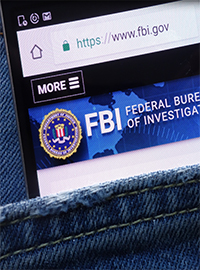| When Exactly Has the FBI Earned Our Trust? |
 |
|
By Timothy H. Lee
Thursday, August 18 2022 |
It was probably the most disillusioning thing that I ever ran into. Because being raised in the ‘50s in the Eisenhower period, I didn’t know that the government wasn’t always straight, and the good guys. They did things to me that made me realize that they’re a tough bunch of cookies. That was Dick Clark, known as “America’s Oldest Teenager” and a beloved cultural icon, reflecting in 1986 on the federal “Payola” pay-for-airplay investigation in which he was hounded but ultimately cleared. I happened upon Clark’s recollections in an unrelated podcast this week, but they instantly resonated in the wake of the Federal Bureau of Investigation (FBI) raid on former President Donald Trump’s private residence. At a time when our social contract seems increasingly frayed, an operation so unprecedented and potentially grave demands an especially high degree of collective trust. Has the FBI earned that collective presumption of trust? Ask yourself how often the FBI has distinguished itself by playing it straight and by the book. Then ask yourself how often it has distinguished itself through excess and impropriety. Attorney General Merrick Garland, his equanimity apparently lost to anger over Trump’s denial of a U.S. Supreme Court seat that he thought was his, insisted this week that we must trust his integrity in approving the raid. Indeed, Garland took umbrage over the mere suggestion that federal agents might act out of politicized rather than pure motives. Only 36% of Americans view Garland favorably, however, and perhaps public familiarity with recurring FBI misdeeds helps explain why. The fact that many of those FBI misdeeds involve its treatment of former President Trump render its trustworthiness especially dubious. Recall that in August 2020, former FBI attorney Kevin Clinesmith pleaded guilty to deliberately falsifying evidence in an affidavit in support of a Foreign Intelligence Surveillance Act (FISA) operation. Clinesmith admitted that he altered an email from the Central Intelligence Agency (CIA) in order to justify a FISA warrant, by taking a CIA email stating that Trump campaign advisor Carter Page had been a previous CIA source and changing it to state that Page was not a source. Outrageously, Clinesmith’s attorney had the audacity to claim that, “Kevin deeply regrets having altered the email,” and that, “It was never his intent to mislead the court or his colleagues.” Why else would someone to deliberately alter evidence, under penalty of perjury, other than to mislead? That incident possesses specific relevance to the FBI’s recent raid on Trump’s residence, since that warrant also relied on an affidavit (which Garland and the FBI conspicuously refuse to release, even in redacted form). Also recall disgraced former FBI agent Peter Strzok, whose 2016 text messages with his mistress and fellow FBI agent Lisa Page promised to “stop” Trump from becoming president. “[Trump’s] not ever going to become president, right? Right?!” Page messaged on August 8, 2016, to which Strzok replied, “No. No he’s not. We’ll stop it.” A week later, Strzok messaged, “I want to believe the path you threw out for consideration in [former FBI Deputy Director Andrew McCabe’s] office – that there’s no way [Trump] gets elected – but I’m afraid we can’t take that risk. It’s like an insurance policy in the unlikely event you die before you’re 40…” Nor is the FBI’s record of malfeasance a recent one. Recall how the bureau under J. Edgar Hoover attempted to wiretap, blackmail and destroy Martin Luther King, Jr. And beyond the orbit of the FBI’s anti-Trump campaign, there was its questionable orchestration of a scheme to allegedly kidnap Michigan Governor Gretchen Whitmer. Incredibly, the Special Agent in charge of the Detroit FBI field office during the botched Whitmer plot was subsequently promoted to oversight of the Washington, D.C., field office. Even more recently, Garland himself testified evasively and dishonestly on the subject of the FBI applying counterterrorism efforts against parents who attend local school board meetings and criticize controversial educational curricula. As for the FBI raid on Trump’s residence itself, we already have proof that it was overly broad. Specifically, FBI agents admittedly confiscated three of Trump’s passports, only to return them under pressure when he complained publicly. Accordingly, the question isn’t whether the raid was excessive, but how excessive. What else did they improperly seize? Perhaps privileged attorney/client documents in their fishing expedition? It remains possible that the FBI raid will prove in accord with the rule of law and concepts of fairness. Both recent and longstanding history, however, create a presumption of skepticism toward Garland and the FBI, not trust. Without that public trust in government to follow the rule of law, our social contract decays and lawlessness becomes increasingly likely. Garland, the FBI and the Biden Administration must avoid inviting that state of affairs. |
Related Articles : |
























